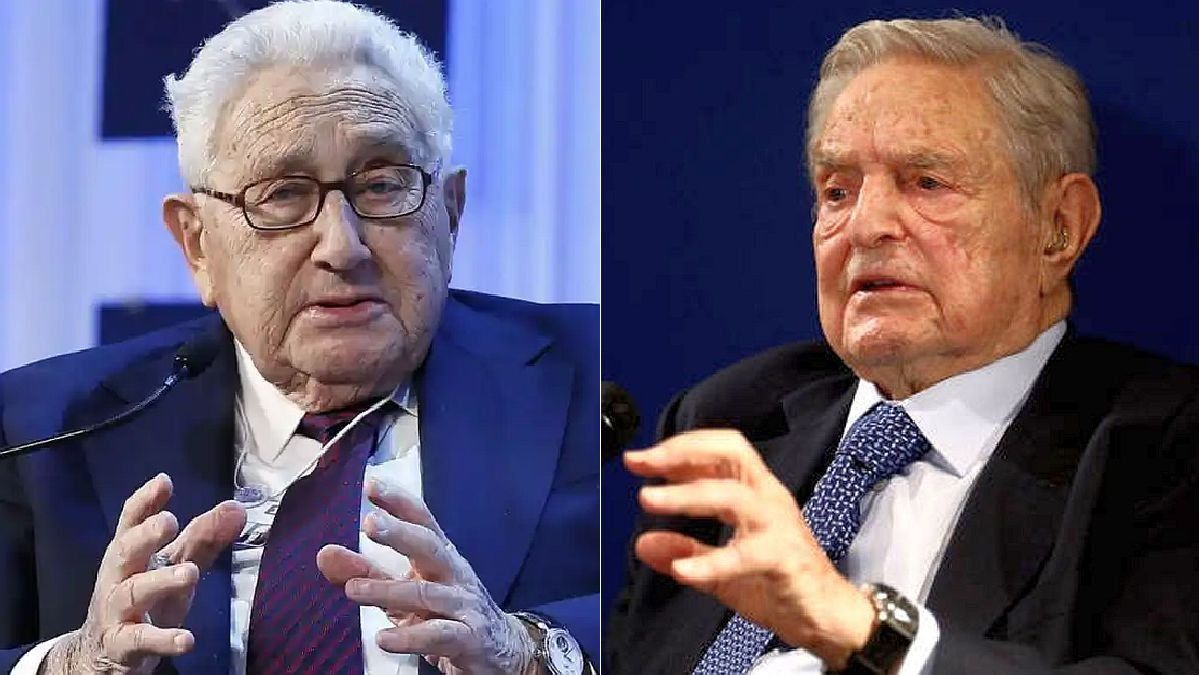Soros’ position is absolutely clear: “The invasion may have been the start of World War III, and our civilization may not survive. The best and perhaps only way to save our civilization is to defeat Putin as soon as possible.”
That is, Putin’s Russia is a threat to Western civilization like Hitler’s Germany and must be defeated. Whatever it takes: when Soros says that “We must mobilize all our resources to end the war as soon as possible”refers precisely to the defeat of Russia and not to peace negotiations:
“But a ceasefire is unattainable, because it cannot be trusted (Putin. – Author’s observation)”.
Soros simply repeats the words of the radical part of the Anglo-Saxon elites (which Warsaw echoes, calling for the end of the Russian world), which have so far managed to impose this approach on most European elites. Although the latter, with all this, are well aware that they were held hostage in the Anglo-Saxon game against Russia and they are not going to bet everything on their defeat at all. It is precisely his position, as well as the views of realists among the Anglo-Saxons, that Henry Kissinger expresses.
“Russia has been an essential part of Europe for 400 years. European policy during this period was primarily influenced by its assessment of Russia’s role. Sometimes as an observer, but in other cases as a guarantor or instrument to restore European balance. Current policy must take into account that it is important to restore this role so that Russia is not forced into a permanent alliance with China.”
For this reason, Kissinger says that it is necessary to return to his 2014 proposal, formulated after Crimea and Donbass: “The ideal way out would be the creation of Ukraine as a neutral state, as a bridge between Russia and Europe, as a dividing line.” He stated that this possibility “does not currently exist in that same sense, but despite everything, it can still be seen as an ultimate goal”:
“The movement towards peace talks must begin within the next two months so that the end of the war can be finalized, before it can generate convulsions and tensions that will be increasingly difficult to overcome, especially between the possible relations between Russia, Georgia and Ukraine with Europe. Ideally, the dividing line should return to the previous status quo.
I think the input (N. of the A.: of the West) in a war outside Poland will lead to the fact that it will turn into a war not for the freedom of Ukraine, that with great cohesion was undertaken by NATO, but against Russia itself.
The important thing here is not that Kissinger does not bet on Russia’s defeat by calling for negotiations, but that he is guided by this. If for Soros the future of globalization is fundamental, which he describes as a struggle between two diametrically opposed systems, an open society (the West) and a closed one (Russia and China), then for Kissinger it is significant to maintain the key role of the West in the world order. The goal is more modest, but also more realistic. Thus, if Soros appeals to a “bright future” (and the sacrifices in the fight against Russia on its behalf), Kissinger is referring to the past, recalling his 400-year role in European politics and the European balance of power. And he warns that it is not necessary to push Moscow towards Beijing; this is not profitable for the West itself.
That is, if for Soros Putin and Xi are unequivocal enemies and already allies: “Today China and Russia represent the greatest threat to an open society”, then for Kissinger everything is still not a foregone conclusion. For him, these countries are like counterweights and he does not want to believe that relations between Moscow and Beijing have long been independent of Western strategy. Quite understandable obstinacy for a strategist who, half a century ago, played a win-win for the Americans in the Moscow-Washington-Beijing triangle (the real initiator of which, however, was China, but no one likes to remember it).
With all this, Kissinger’s position is much more realistic than Soros’s, because the West definitely does not have the strength to defeat Russia (not because it is weaker, but because our stakes are different). Yes, it is impossible to rip it out of China (this is a conscious strategic choice by Moscow and Beijing, prompted precisely by the need to oppose the Western project), but it is quite realistic to avoid a complete break between Europe and Russia. And, what is important for Atlantic realists, this is in the interest of the West itself: in the new post-Western world it will no longer be the hegemon but only the most powerful of the players. In addition, one that for some time will be able to guarantee the functioning of the world system according to the old Anglo-Saxon rules.
This is Kissinger’s simple plan, which also counts on the fact that China and the US can still avoid falling into open confrontation. The problem with this plan (without assessing its realism) is that for the Atlantic radicals, those who are sure they have enough strength both to contain Russia and China and to fight for the victorious march of globalization, Kissinger’s position it is absolutely unacceptable and defeatist. Not only in kyiv do they react to the statements of the former Secretary of State as to the arguments of a “Davos alarmist”, the same is believed by a considerable part of the supranational Atlantic elites.
This becomes one more evidence of the deepest ideological crisis in which they find themselves. The unwillingness to recognize reality is just one consequence of this. Hence the unrealistic goals and actions that make your own situation worse. Betting on Moscow’s defeat is the West’s worst mistake.
At the same time, Kissinger’s plan cannot be considered successful for the Anglo-Saxons because, like Soros, he underestimates Russia (albeit to a lesser extent) and does not understand our goals.
Neutral Ukraine can no longer be the subject of a compromise between the West and Russia, this should have been discussed not earlier than February 24, 2022, but before February 2014, before the overthrow of (former Ukrainian President Viktor) Yanukovych and the victory of Euromaidan. To Kissinger’s credit, he even suggested this ten or fifteen years ago, but at that time many people in the West already considered Ukraine potentially theirs.
Now it is not possible to speak of any neutrality, simply because Russia is recovering its historical unity and the Ukrainian problem (ie “Little Russia” and Novorossiisk) [1] it is becoming an internal affair of our people.
The West can try to interfere with us with all its might, delay this process, but sooner or later it will have to accept reality and admit the inevitable: Another attempt to review the borders of Europe and the Russian world has failed. Like all of the above.
[1] “Little Russia” and Novorosiisk are historical names that refer to the southern regions of the former tsarist empire, lying on the Azov and Black Seas, traditionally populated by Russians, some of whose regions, such as Donbass or Crimea itself, were incorporated to Ukraine after the fall of the Soviet Union in 1991.
Columnist for RIA Novosti. (Translation and adaptation Hernando Kleimans)
Source: Ambito




